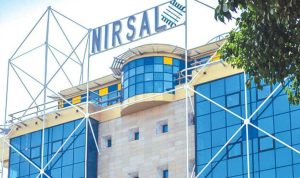NIRSAL’s ₦70bn Agric Financing Signals Renewed Confidence In Sector
The Nigeria Incentive-Based Risk Sharing System for Agricultural Lending (NIRSAL Plc) has facilitated over ₦70 billion in commercial financing for agribusinesses as of the third quarter (Q3) of 2025, a development analysts describe as a sign of renewed confidence in Nigeria’s agricultural credit ecosystem.
The achievement, regarded as the agency’s strongest performance since inception in 2013, represents nearly a quarter of its cumulative ₦270 billion funding facilitated for the sector. NIRSAL said the performance reflects the success of its revamped institutional strategy under a new Board and Executive Management.
The timing of the intervention, experts note, is significant, given the consistent decline in agricultural lending over the past three years—from 6.18 per cent of total bank credit in 2022 to 4.82 per cent in 2024—coupled with slowing sectoral growth, which dipped from 2.5 per cent to 1.7 per cent within the same period.
By leveraging its value-chain modelling, technical support, and risk-sharing mechanisms, NIRSAL has reportedly restored confidence among financial institutions, enabling the flow of fresh capital into key commodity value chains such as grains, cocoa, shea, and livestock.
According to the organisation, about 32 per cent of the ₦70 billion facilitated funds directly supported value-added agricultural exports—contributing to an improved balance of trade for the sector. Meanwhile, agriculture’s share of total bank lending has rebounded to 5.33 per cent as of May 2025, signaling a gradual turnaround in the sector’s credit outlook.
Two newly licensed banks have also joined the agricultural financing space, adopting NIRSAL’s frameworks and contributing to the ₦70 billion achieved so far this year.
In a statement, NIRSAL’s Managing Director and Chief Executive Officer, Sa’ad Hamidu, said the latest milestone proves that agriculture can attract sustainable commercial financing when supported with appropriate risk mitigation and technical structures.
“₦70 billion may appear modest relative to Nigeria’s financing gap in agriculture, but it demonstrates that the sector can be commercially viable. With the right blend of capital, technical capacity, and risk-sharing, agriculture can become resilient and globally competitive,” Hamidu said.
He expressed confidence that NIRSAL would achieve its ₦150 billion facilitation target for 2025, noting that the current figure was recorded ahead of the peak harvest season—when financing needs for offtake, storage, and input distribution are typically at their highest.
Beyond headline figures, Hamidu emphasised that NIRSAL’s model is designed to address structural bottlenecks in agricultural financing through a holistic approach that integrates prospect identification, deal structuring, business advisory, and credit guarantees.
He noted that over 1,100 bank officials have been trained on agricultural lending dynamics under NIRSAL’s capacity-building programmes, resulting in improved loan approvals and sector-specific credit design. In addition, 450 value chain actors have received training in feedlot management, commodity export, and climate finance, a development expected to strengthen competence across subsectors.
As part of its forward-looking initiatives, NIRSAL is developing the NIRSAL LandBank Portal, a digital ecosystem aimed at linking agricultural stakeholders—from research institutions to markets—through data-driven insights for investors, policymakers, and development partners.
Hamidu explained that the digital platform would enhance transparency, reduce investment risks, and foster evidence-based decision-making across Nigeria’s agricultural value chain.
“The LandBank Portal and our broader reforms will consolidate gains made so far and ensure that agricultural finance in Nigeria is not just about access to credit but about building a resilient, competitive, and knowledge-driven ecosystem,” he stated.
Analysts say NIRSAL’s approach could mark a turning point for agricultural credit delivery in Nigeria, particularly as the Federal Government pursues its vision of building a $1 trillion economy through diversification and sustainable productivity.

